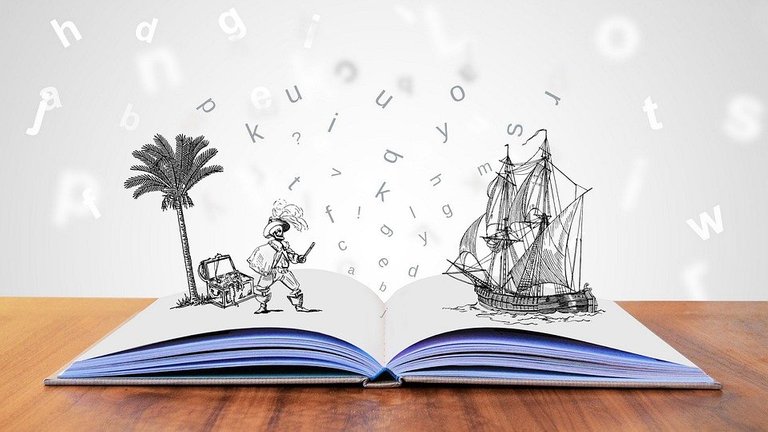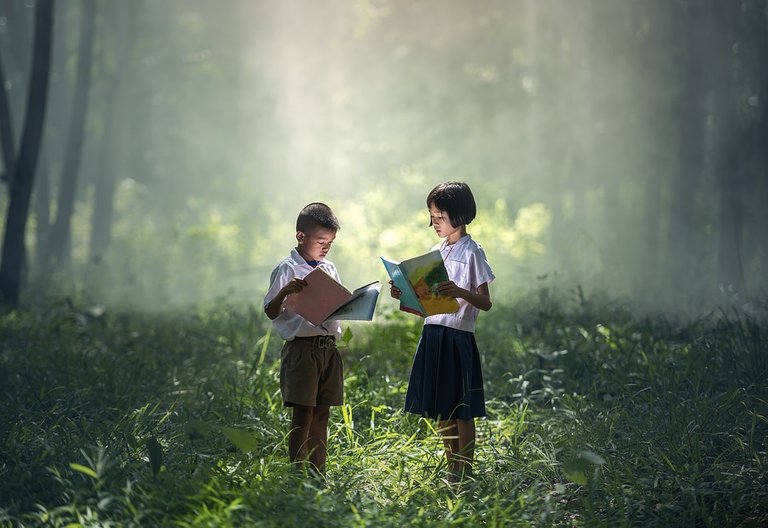Those who think they are protecting the child when they write or speak down to them only condemn the child to cognitive and emotional isolationism.
In the world of literature, the debate about what constitutes children’s literature and what not, or whether children's literature should be considered Literature at all is usually settled around the issues of language and purpose: How is the story written? How is language used? Does it have an overt didactic purpose?
Creative and challenging language in a good children's book should be the bridge that will connect the otherwise isolated child to the world of imagination, but also to the real world they are supposed to adapt to and "conquer."
As a ghost writer, who sometimes edits what others have written, every time I am asked to edit a text solely on the basis of vocabulary because the "author" considers that it is beyond the child's reach, too difficult, etc. I feel as if I am being forced to put someone behind bars.
Even though there are obvious developmental factors that make a three-year-old unsuitable to read, say, Harry Potter or The Chronicles of Narnia, to restrict a text to the intended audience's alleged linguistic corpus, is to limit the child's potential. Children can infer meaning from context, develop their linguistic curiosity, and be exposed to a world beyond the confines of what adults consider safe when they are read challenging texts. If the text is well written, if the story is engaging, and if the reading is well performed, vocabulary is never an issue.
One wrong assumption from these conservative "writers" who demand "their" books to be written in a language that is accessible to the child (especially small children who can't still read) is that the act of reading is a mechanical passive one. Even though we may find really bad readers, it is doubtful that a parent or care-giver will not perform what they read to children.
Reading, especially literature, is a performance.
In that act of performing the story on the pages, the reader acts, mimics, exaggerates, makes noises and voices and usually interact with the audience in parenthetical pauses to make sure they are following, to pose questions, to anticipate events, or to clarify meaning.
Thus, there is no need to change a word like "applaud" and substitute it for "clap" mostly because the child allegedly knows "clap" only. The reader will most likely clap when they read "applaud" and the child will surely understand next time they hear the word, even without the performance of it.
Like trees, children need room to grow. Linguistic limitations or dosifications may hinder children's cognitive development during their most important years (0-3).
Most children like to be challenged; they are not afraid of big books or big words. They may be intrigued by them, which is a good thing. It is our duty as adults, parents, librarians, or teachers, to expose them to good literature, written in the most creative language possible, about the widest variety of topics possible (without having to harm their sensibility and their fragile psychological stage, of course).
Children are usually exposed to language in its entirety when they watch television or movies (unless they are watching Teletubbies). They do not need overprotective or didactic limitations in the literature that they read or are read. They will decide, on their own, what entertains them and what does not. They will grasp what they can and ignore what they don’t get.
It worries me that this generation of children, burdened already with the overwhelming technological overstimulation and all the political correctness that is already distorting or sugar-coating world views, will also be under-stimulated by the one source of knowledge and entertainment they should be getting the most from. Storytelling in the form of books worked very well for centuries. Whatever comes after, whatever technological gadget replaces it, should at least provide children with the minimum linguistic stimuli to awaken artistic, social, and emotional reactions to make children ask for more and better stories.
Thanks for reading





When I read your publication I feel that parents underestimate the intelligence and understanding of a child, we give them everything digested, even reading, however we do not realize that they are exposed to the media, video games and cell phones.
If children are capable of digesting so much information, why filter reading?
It worries me to see that it is a habit that is being lost, perhaps those of us who cultivate values in children should try to prevent its extinction. Children read all kinds of nonsense on the Internet, and even with tablets they don't read anymore because they put robots to perform this task out of laziness.
As an anecdotal case I can comment that when I was a child I used to read to my daughter a selection of children's stories from Larousse whose authors were Charles Perrault, the Brothers Grimm, Hans Christian Andersen. The endings of those tales and the development of the stories were somewhat different from what was seen in movies and television and even in other books. The child already associated what she read with the illustrations, and even if she saw one of these stories in the Disney version, she told me that it was not like that. I do not regret having done this. Besides, on Sundays she saw the advertising inserts in the newspapers, she flipped through them, and when we went to the market to buy, she already knew the products without knowing how to read.
I'm sorry if I digressed a bit, but when the publications are so clear and well written, the reader's thoughts drift to topics related to reading. Excellent! Best regards.
That was an excellent digression. It's great anecdotal evidence. I think there are plenty of it, but the academic world, which sometimes informa and influences the publishing industry, tends to rely more on theory than in practice.
That's how we got to these modern models for rasing children.
Reading good stuff is a full time job, especially now when one has to filter so much crap in social media.
Children are easily hooked by silly stuff, but if we give them the tools they need to discern what's best for them, they will make great use of their time and talents.
While my children were learning to read, and I read to them, I saw that they could naturally understand big words in context. One of them had a terrible time decoding individual words, and could not spell at all, but was top of the class in overall comprehension and understanding of spoken big words.
There you go. It was my personal experience and that of all my children. I have to take a deep breath when people predict that "children (as if they knew in advance every child who will read the book) will not get it."
I could not agree more! On all counts. What you allude to, and which is really important is the reading aloud, to. It was this, especially my grandmother reading to me, that made me ***want *** to learn to read. One of the books she had to read was about a bear who went to sleep for a year. One of my first "big" words? Hibernate...
Isn't that wonderful when one can handle that kind of big word from early age!
I remember learning that word from an anime (Fables from the Green Forest)
That cartoon prompted in me an interest in trading about nature, animals, weather and everything related to natural sciences. Big words are not the problem; how they are presented to us is.
Every day I run into a situation in which a teenager displays, how can we put it nicely... lack of vocabulary? They can't express themselves clearly and coherently and they have an even harder time understanding others in formal contexts. Sometimes, even in informal situations, words that we may consider common come up and cause that puzzling look in kids who should be more informed if only they had developed their reading skills and interests.
Exactly. Because context context conveys so much and in a story, and in "good" a new word is often instinctively understood from tone and mood. That said and because I remember writing a paper for a conference. It must be nearly 20 years ago, now, and our paper was on online writing tutoring and the organisers' instructions were clear: no idiom.
I get that many of the participants were second language English readers, but it's almost impossible to write in one's mother tongue wothout idiom. Obviously, the more obscure idioms, yes, but I would posit the same argument about "big" words. One of the reasons I remember this is because in a chunk that I wrote, my use of red herring was chopped.
Interesting. I agree. For L2 learners, not to know idiomatic expressions often times feels like a handicap.
It's funny that they chopped red herring, that being a rather formal (aka well known and quite useful) rhetorical and literary expression.
Language courses are the best example of how problematic limiting the language can be. Sooner or later one has to get out of what is pedagogically prescribed or convenient
Actually, we chopped red herring. And yes, I think that deliberately excluding excluding idiom does everyone a disservice. Plain language is good. To a point and for legal/business documents. That said, for L2 learners/speakers in any language, idiom is difficult but learned and understood the same way as you suggest children do, big words, and from mother tongue speakers and writers. I worked with a fellow whose mother was Afikaans and father Polish. They had to communicate with each other in English. So he claimed both English and Afrikaans as mother tongue. However, his English, unlike his Afrikaans, was void of idiom and actually quite wooden. Because, IMO,of no exposure mother tongue speakers. He'd be in his late 60s now, so I am talking about an era when South Africa was very separate. Not just black and white, also English and Afrikaans.
Another long one! Sorry for the ramble... Happy Tuesday!
No need to apologize. Very interesting. I agree. No contact with native speakers makes our L2 bookish and our interactions outside formal context quite awkward.
I started a conversation course today (intermediate level) and one thing I remind my students is that they have the advantage of internet today. It allows them to interact with people from anywhere or access all kinds of linguistic registers. We did not have that when I learned and we would find ourselves using idioms long extinct because we were using decades old textbooks.
Children are very perceptive and easily create models of the story layer by layer. I read some stories to my 2 year old nephew, he understands parts of it and express them in certein contexts, like wolf howl or alibabas :sim Sim, etc.
That's right. Children are creative and resourceful. The more we underestimate and overprotect them, the less they develop their potentials.
In Venezuela the current "philosophy of education" favors an extremely lenient approach to teaching and learning with an alleged emphasis on the students, but their student-centered approach is nothing but a populist take on creating a population as ignorant as possible; a functional illiterate mass that can't read or understand words and can't read or understand the world either.
The rewards earned on this comment will go directly to the person sharing the post on Twitter as long as they are registered with @poshtoken. Sign up at https://hiveposh.com.